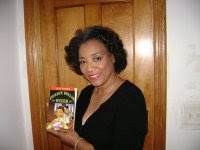Last Friday I attended a first-of-its-kind graduation. The 44 women were dressed in blue graduation gowns with matching mortar boards. The smiles on their faces reflected their pride in having achieved the goal of graduation after completing their curriculum.
Most family members are always proud at a graduation, and this graduation was no exception. I had never seen so many faces filled with pride as those displayed by the audience. As they watched their loved ones march down the aisle to get their diplomas, the cheers from both the audience and members of the graduation class reflected the end of one arduous journey and the beginning of another. You see, the average age of the graduating women was around 40 and the curriculum they had just finished was one from ACCESS Health Network. It was the Women Returning Home Inaugural Graduation for women who are ex-offenders.
I never asked any of the graduating women about their past. Their past isn't as important as their present and future. You could see in their eyes the obstacles they had overcome. Every one of the women who graduated had been drug and alcohol free for at least 30 days. Remaining that way is always a challenge seeing that they are still inner city residents with all the trapping of turning back to drugs and alcohol is smack dab in their faces. But because of the support of those who run Women Returning Home (WRH), they were able to stave off the lure of returning to their former lifestyles and remain committed to the program.
When the names of the workers from ACCESS were called, the cheers were thunderous. The workers, case managers James Jones, Carmelita Tunstall and Basje Lewis along with team leader Takala Welch, had gone above and beyond in supporting those ladies as they transitioned back into everyday life. Let us too applaud them and the women who are now given a second chance. The women are back with their families and can try to heal the pain and suffering that their incarceration brought on.
As I watched the joy those ladies were expressing, I thought about the people they left behind in the penitentiary. Will those other women who will one day return to the community find a service like WRH waiting for them? Or will they end up alone and without support, become a part of the cycle of recidivism? I also thought how those women who are now home can be counted as part of the current 2010 census and that their individual count will help to bring monies back to our community for programs like the one they had just attended. And I also thought of the hundreds of thousands of households in this city who are ignoring the census.
There are millions of federal dollars a community can get based on the census counts. For example, the federal government only acknowledges the census count based on the form it receives. So, although Chicago may have three million residents, if no one sends in their census count, then programs like WRH can't ask for money to serve 100,000 thousand ex-offenders.
But if every Chicagoan returns their forms, or calls in their census to 1-866-872-6868, we can all be counted and the monies that are needed to service the needs of Chicagoans can be met.
And here's another reason to complete the census: Our community hasn't been targeted to get counted. With every census the African-American population is being eroded. Last time it was the bi-racial category. This time they are making Hispanic, which is a culture and not a race, a category. So take 10 minutes and let the government know about you and your entire family. Get counted to be counted!
You Finished The Book - Now What Did You Think
13 years ago

No comments:
Post a Comment